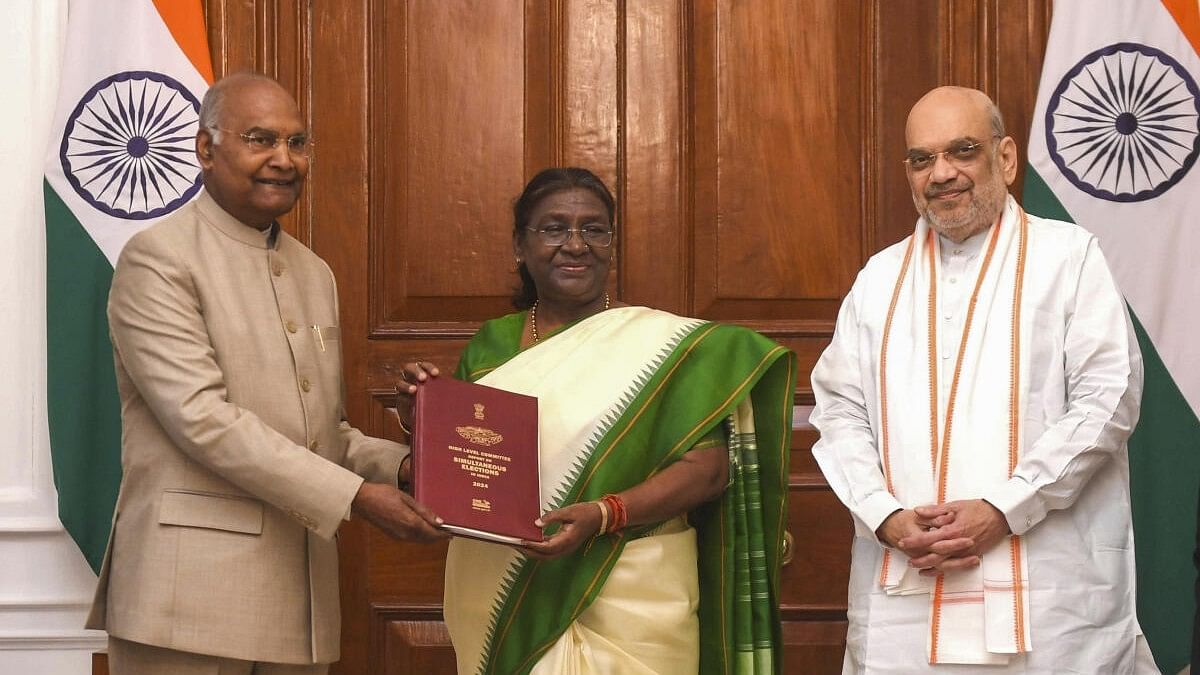
President Droupadi Murmu being presented a report on simultaneous elections in the country by former president Ram Nath Kovind who heads High-Level Committee (HLC) on 'One Nation, One Election', and Home Minister Amit Shah, at Rashtrapati Bhavan.
Credit: PTI Photo
The Narendra Modi government has officially endorsed the proposal for a “One, Nation, One Election” (ONOE) system with the Union cabinet accepting the recommendations of the committee headed by former President Ram Nath Kovind, which it had appointed.
The government and the BJP have persisted with the idea for many years, and now a blueprint of the plan has emerged. The committee could only have done a job scripted by the government, and a former President’s name was used to give credibility to the recommendations.
The committee has proposed simultaneous elections to the Lok Sabha and state assemblies as a first step, and municipal and panchayat elections within 100 days in the next phase. It has laid out a roadmap and procedures for implementation of the idea and prescribed no less than 18 constitutional amendments to enable it.
The proposal for simultaneous elections has been debated for long but it does not have support outside the BJP. It does not enjoy support even from all the BJP’s allies. It comes from the BJP’s idea of a unitary country with one polity, one process and one character. It goes against the spirit and reality of diversity in politics, society and all aspects of life in the country, and is at odds with the federal nature of the polity. It will give an unfair advantage to national parties and will result in rhetoric over national issues – and non-issues -- overshadowing regional and state-specific issues in the elections.
The country’s politics has evolved from the early years when simultaneous elections were held for parliament and state assemblies. This was a natural development and should not be artificially undone by forcing the country on an ideological Procrustean bed. India is a Union of States, and the people of the states should have the freedom and the environment to make their political choices. The enforced stability provided by ONOE will be at the cost of accountability, which is at the heart of democracy.
The main argument being advanced in favour of simultaneous elections is that they will reduce the expenditure on elections for the exchequer, political parties and candidates, and limit the disruptions in governance. But democracy does not come cheap. Moreover, the bigger concern, and object of reform, must be the untold sums of money that political parties collect and spend to win elections, whether held simultaneously or at different times. It seeks merely to hoodwink the public.
The government has said that it wants to create a consensus on ONOE, but it is not sincere about it. Opposition parties have made clear their concerns, including to the Kovind committee itself.
Yet, the committee made its pre-determined recommendations, and the government accepted them. India’s political system is worked by its political parties, and if a large number of them do not want a ONOE system, it cannot happen. It is also unlikely that the government will be able to get the required constitutional amendments passed in the present scenario.